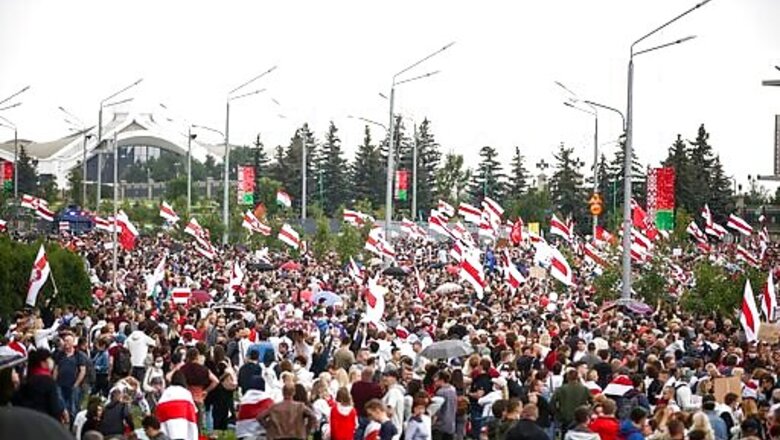
views
KYIV, Ukraine: A leading opposition activist in Belarus was held on the border with Ukraine on Tuesday after she resisted an attempt by authorities to deport her as part of government efforts to end a month of protests against authoritarian President Alexander Lukashenko.
Maria Kolesnikova, a member of the Coordination Council created by the opposition to facilitate talks with the longtime leader on a transition of power, was detained Monday in the capital of Minsk along with two other council members.
They were driven early Tuesday to the border, where authorities told them to cross into Ukraine. Kolesnikova refused, and remained on the Belarusian side of the border in the custody of Belarusian authorities.
Two other council members, Ivan Kravtsov and Anton Rodnenkov, crossed into Ukraine.
Opposition activists said Kolesnikova ripped up her passport to avoid being forced to move to Ukraine.
Anton Bychkovsky, spokesman for Belarus’ Border Guard Committee, confirmed she is in the custody of Belarusian authorities but refused to give any details of what happened on the border.
Belarus has used similar tactics to force other opposition figures to leave the country, seeking to end a month of demonstrations that followed the reelection of Lukashenko in a vote that protesters see as rigged. Lukashenko has ruled the country for 26 years, relentlessly stifling dissent and keeping most of the economy in state hands.
The 66-year-old former state farm director has rejected criticism from the United States and the European Union, which said the Aug. 9 election was neither free nor fair and shrugged off their demands to open a dialogue with the opposition.
Sviatlana Tsikhanouskaya, the main opposition challenger to Lukashenko, left for Lithuania a day after the election under pressure from authorities.
Addressing the Council of Europe’s Parliamentary Assembly on Tuesday, Tsikhanuskaya called for international sanctions against Lukashenko and other government officials.
We need international pressure on this regime, on this one individual, desperately clinging onto power,” she said.
Tsikhanouskaya stated that Lukashenko doesn’t have any legitimacy after stealing the vote, warning other countries against making any deals with the Belarusian government.
He does not represent Belarus anymore, she said.
Kolesnikova, a 38-year-old flute player who led a popular arts center, entered politics just before the election. She led the campaign headquarters of a top potential challenger to Lukashenko, and when he was barred from running and jailed on charges widely seen as political, she joined Tsikhanouskayas campaign.
Another associate of Tsikhanouskaya, Antonina Konovalova, disappeared Tuesday after a court fined her for taking part in a weekend protest.
After a brutal crackdown on protesters by police in the initial days after the vote that stoked international outrage and swelled the ranks of protesters, authorities in Belarus have switched to threats and selective arrests of activists and demonstrators.
Belarusian prosecutors have opened a criminal investigation into members of the Coordination Council, accusing them of undermining national security by calling for a transition of power. Several council members were arrested and others were called for questioning.
Last week, Pavel Latushko, a former minister of culture and ambassador to France who joined the opposition council, traveled to Poland after facing threats and being questioned. His departure came a day after Lukashenko warned that Latushko had crossed a red line and would face prosecution.
On Saturday, Tsikhanouskaya associate Olga Kovalkova also moved to Poland after the authorities threatened to jail her for a long time if she refused to leave the country.
Kovalkova said agents of the Belarusian State Security Committee, or KGB, put her into a car, where she was told to lie on the floor, unaware where they were taking her. She was dropped off in no-mans land between the Belarus and Poland border, and Polish border guards asked a bus driver headed for Poland to take her on board.
Despite the pressure on opposition activists, daily protests have continued and crowds have swelled on the weekends. An estimated 100,000 attended a rally Sunday, despite heavy rain.
Observers say Lukashenko hopes to stem the protests with selective repressions against the opposition leaders and soothe public anger with vague talk about constitutional reform and a new election at an unspecified date. Russia, Lukashenko’s main sponsor and ally, has endorsed his promise of such a reform.
The authorities’ scenario is clear push all the leaders out of the country and step up repressions against demonstrators while imitating a dialogue on a constitutional reform under the patronage of the Kremlin, said Valery Karbalevich, an independent Minsk-based analyst. Lukashenko hopes that the rallies of 100,000 will fizzle after the expulsion of opposition leaders, but so far it has had an opposite effect, helping fuel more protests.
–
Associated Press writers Vladimir Isachenkov in Moscow, and Monika Scislowska in Warsaw, Poland, contributed.
___
Follow all AP stories on the developments in Belarus at https://apnews.com/Belarus
Disclaimer: This post has been auto-published from an agency feed without any modifications to the text and has not been reviewed by an editor




















Comments
0 comment